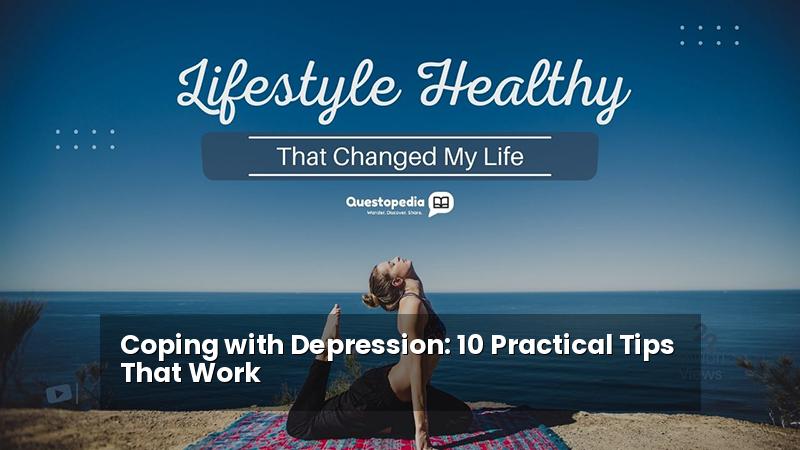Coping with Depression: 10 Practical Tips That Work
Depression can feel like an overwhelming weight, a dark cloud that obscures even the smallest glimmer of hope. If you’re struggling with depression, know that you’re not alone. Millions of people experience it, and there are effective strategies for managing symptoms and improving your overall well-being. This article provides 10 practical tips, grounded in research and real-world experience, to help you cope with depression and reclaim your life. Remember to always consult with a mental health professional for personalized guidance and treatment.
Understanding Depression
Before diving into coping strategies, it’s important to understand what depression is. Depression is more than just feeling sad; it’s a persistent and pervasive mood disorder that affects how you think, feel, and behave. Symptoms can include persistent sadness, loss of interest in activities, fatigue, changes in appetite or sleep, feelings of worthlessness, and difficulty concentrating. Recognizing the signs of depression is the first step toward seeking help and finding effective coping mechanisms. If you are experiencing suicidal thoughts, please reach out to a crisis hotline immediately. A helpful resource is the National Institute of Mental Health (NIMH) which provides resources for finding mental health support.
1. Prioritize Sleep Hygiene
Sleep and mood are intricately connected. Depression can disrupt sleep patterns, leading to insomnia or excessive sleeping. Establishing a consistent sleep schedule, creating a relaxing bedtime routine, and optimizing your sleep environment can significantly improve your mood. Aim for 7-9 hours of quality sleep each night. Avoid caffeine and alcohol before bed, and ensure your bedroom is dark, quiet, and cool. Improving your sleep hygiene can make a real difference.
2. Engage in Regular Physical Activity
Exercise is a powerful antidepressant. Physical activity releases endorphins, which have mood-boosting effects. Even moderate exercise, like a brisk walk or a bike ride, can significantly reduce symptoms of depression. Aim for at least 30 minutes of moderate-intensity exercise most days of the week. Find an activity you enjoy to make it easier to stick to your routine. For more information on the benefits of exercise, see the Mayo Clinic’s article on Depression and Exercise.
3. Nourish Your Body with a Healthy Diet
What you eat can impact your mood. A balanced diet rich in fruits, vegetables, whole grains, and lean protein provides essential nutrients that support brain function and overall well-being. Avoid processed foods, sugary drinks, and excessive caffeine or alcohol, as they can worsen symptoms of depression. Consider consulting a registered dietitian for personalized dietary advice. Focusing on healthy eating habits is crucial for overall well-being.
4. Practice Mindfulness and Meditation
Mindfulness and meditation techniques can help you become more aware of your thoughts and feelings, allowing you to manage them more effectively. Practicing mindfulness involves paying attention to the present moment without judgment. Meditation can involve focusing on your breath, a mantra, or a guided visualization. Even a few minutes of daily practice can reduce stress and improve your mood. Headspace and Calm are popular apps that offer guided meditations. You can also find information on mindfulness on our homepage: Questopedia.
5. Connect with Others
Social isolation can exacerbate depression. Make an effort to connect with friends, family, or support groups. Sharing your thoughts and feelings with others can provide emotional support and reduce feelings of loneliness. Even a simple phone call or a virtual coffee date can make a difference. Social connection is a powerful antidote to depression.
6. Set Realistic Goals
Depression can make it difficult to accomplish even the simplest tasks. Setting unrealistic goals can lead to feelings of failure and worthlessness. Break down larger tasks into smaller, more manageable steps. Celebrate your accomplishments, no matter how small they may seem. Focus on progress, not perfection.
7. Challenge Negative Thoughts
Depression often involves negative and self-critical thoughts. Learn to identify and challenge these thoughts. Ask yourself if there’s evidence to support your negative thoughts, or if you’re jumping to conclusions. Replace negative thoughts with more realistic and positive ones. Cognitive Behavioral Therapy (CBT) is a therapeutic approach that focuses on identifying and changing negative thought patterns.
8. Engage in Activities You Enjoy
Depression can rob you of your interest in activities you once enjoyed. Make an effort to re-engage in hobbies or activities that bring you pleasure. Even if you don’t feel like it at first, forcing yourself to do something you enjoy can gradually improve your mood. Think about what used to bring you joy and try to incorporate those activities back into your life. Rediscovering your favorite activities can be therapeutic.
9. Practice Gratitude
Focusing on what you’re grateful for can shift your perspective and improve your mood. Keep a gratitude journal and write down things you’re thankful for each day. Expressing gratitude to others can also boost your mood and strengthen relationships. Taking a moment each day to reflect on things you’re grateful for can make a difference.
10. Seek Professional Help
Depression is a serious condition that often requires professional treatment. If your symptoms are severe or persistent, seek help from a mental health professional. Therapy, medication, or a combination of both can be effective in treating depression. Don’t be afraid to ask for help; it’s a sign of strength, not weakness. You can find information about mental health on our homepage Questopedia.
Conclusion
Coping with depression is a journey, not a destination. It requires patience, persistence, and a willingness to try different strategies. These 10 practical tips can help you manage your symptoms and improve your overall well-being. Remember to be kind to yourself, celebrate your progress, and seek professional help when needed. You can and will feel better. We hope these practical tips help you on your journey. Also check out our other articles on mental health on Questopedia.






